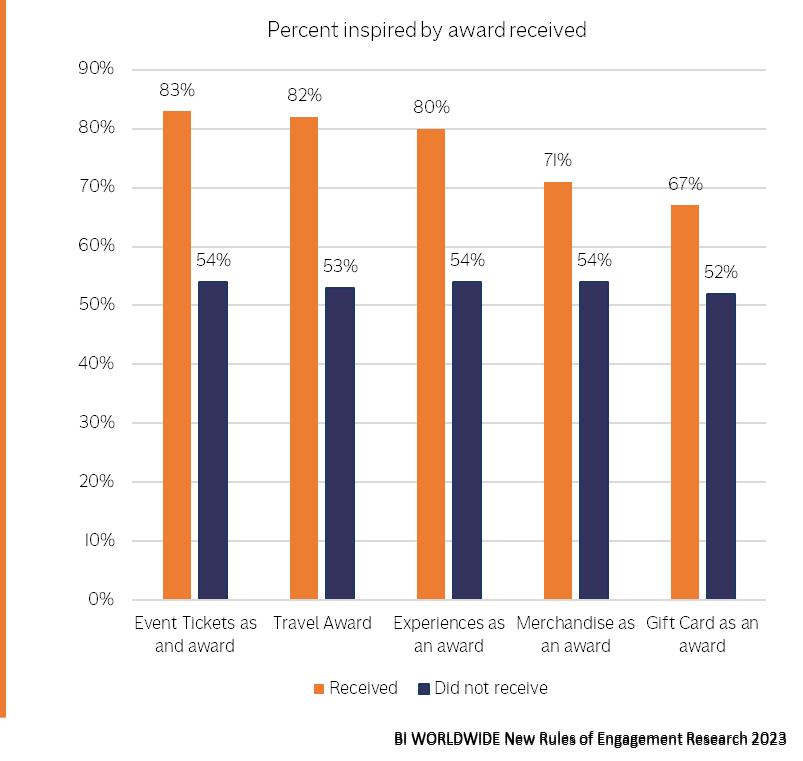Recognition has become widely understood as a valuable process for acknowledging great performance, but it’s only recently that the wider benefits a recognition-rich culture brings and the true effect of intrinsic rewards on employee performance have been quantified.
In this article, we’ll explore the impacts of rewards on employee performance and what reward types are effective in motivating employees.
- When should you reward employees?
- The impacts of rewards on employee performance
- Reward ideas to enhance employee performance
When should you reward employees?
Many organisations now include recognition programmes as part of their overall employee value proposition and will likely be utilised to show appreciation for positive behaviours or noteworthy performance.
A survey of employees by Gallup found that recognising employees at least once per week is best for employee recognition. To achieve this, we see best-in-class recognition programmes weave recognition practices through all the moments that matter within an employee journey.
The impacts of rewards on employee performance
There are multiple benefits of encouraging and rewarding positive behaviour. Recognition is powerful, but when it’s magnified with the addition of a reward, that impact is multiplied.
Why? When employees receive a meaningful reward, a cocktail of neurochemicals responsible for giving us that positive emotional feeling and rush are delivered and serve the recipient with a whole host of benefits:
- Dopamine - acts as a deciding factor in the human body that governs motivation and craving.
- Serotonin – promotes happiness and puts us in a good mood.
- Adrenaline – gives humans a release of energy and increased effort.
- Oxytocin – limits the release of cortisol and is responsible for reducing anxiety and fear. Also linked to promoting positive behaviours and emotions, such as trust, that helps encourage continued socialising.
These four neurochemicals work together to produce an emotional response that drives motivation, happiness, energy, belonging, and positivity. The frequent release of these chemicals has a profound impact on improving the overall wellness of individuals and, when achieved company-wide, plays a big role in creating a positive corporate culture and improving the manager/employee relationship.
In a BI WORLDWIDE study, we compared the impact of recognition and rewards and found that employee turnover is 4x higher among employees with the lowest ‘recognitions with awards’ receiving rates compared to the highest rate of ‘receiving recognition with awards’.
Understanding that levels of inspiration directly impact employee engagement and subsequently retention, effort, and satisfaction. Unlocking the power of rewards within your recognition programme simply makes good business sense.
Rewards motivate employees
Rewards, whether monetary or non-monetary, can motivate employees to perform at their best. The prospect of receiving a reward can drive employees to set and achieve challenging goals, meet deadlines, and consistently put in their best effort.
When employees understand that rewards are linked to their behaviours, performance, and contributions to the organisation, they’re more likely to align their efforts with the company's strategic goals and priorities.
Rewards enhance employee engagement
Employee engagement, productivity and performance are 14 per cent higher than in organisations without recognition (Deloitte). Understanding how rewards trigger our emotional responses, it’s easy to see how they can enhance employee engagement by making employees feel valued and appreciated.
Recognition and appreciation programmes can boost morale, increase job satisfaction, productivity and efficiency, and foster a positive work environment, which can, in turn, lead to improved performance.
Rewards can improve employee retention
Providing rewards and incentives can help retain talent. According to research, more than 58 percent of UK employers are increasing compensation, while 45 per cent have implemented employee recognition programmes to boost retention.
When employees feel that their contributions are recognised and rewarded, they’re more likely to remain with the organisation rather than seek opportunities elsewhere.
With high-performing employees often being sought after by competitors, rewards can help in retaining key talent within the organisation as part of the overall employee value proposition.
Rewards can improve employee satisfaction
In the Gallup State of the Global Workplace 2023 report, 28 per cent of those asked said that they’d change their organisation’s benefits and pay (including giving rewards) to make it better.
Rewards contribute to employee satisfaction which, in turn, can positively impact employee performance. Satisfied employees are more likely to be engaged, committed, and willing to go the extra mile to meet organisational goals.
Reward ideas to enhance employee performance

But what about reward type? There are multiple studies and research that conclude cash is less motivating than experiences and tangible rewards, but why?
The cash end of the Rewards and Experience Efficacy Continuum above is more quantitative and financial in nature. Among other reasons, it puts people into a calculative mode and the reward begs the question, "Is this a good deal?".
Because of this, cash is less effective at getting results, whereas travel, tickets to a show or luxury merchandise are more emotional in nature and the question becomes, "Do I want it?". We refer to this as “mental accounting”. Rewards separate wants from needs.
There are a few key psychological reasons why tangible rewards such as merchandise, experiences and travel are more effective than cash when it comes to triggering inspiration.
They’re memorable
Recipients are more likely to remember where and why they earned the travel trip or latest tech they received over cash, which can easily get folded into the daily budget and used for buying forgettable purchases such as fuel or groceries.
They’re re-consumptive
The best rewards are re-lived. Whether it’s looking back over photos from a once-in-a-lifetime trip, or receiving a compliment about a long-desired watch received, the moment will provoke an emotional response and the chance to re-live the positive emotions associated with earning the award.
They avoid entitlement
Monetary awards often become viewed as part of regular compensation and lead the recipient to expect the same or more cash in the future, an expectation that may not be sustainable.
They’re sociable
Recipients should feel comfortable discussing and sharing their rewards with friends and family. Social norms typically suggest it’s not ‘polite’ to discuss money in the same way we would talk about a luxury reward or experience, making the latter a more effective motivator.
The further away from cash, the more effective the rewards become at changing behaviour. In our 2023 New Rules of Engagement® Study we explored the levels of inspiration experienced correlated against the reward received.

Regardless of the reward type you choose, to be effective, rewards need to be as personalised for the individual as possible. Here’s our breakdown of common reward types and how they can enhance employee performance.
Symbolic Awards
In a recognition-rich culture, the opportunity to earn symbolic awards of this type can be very aspirational in certain regions and cultures around the world such as Asia and Latin America.
Certificates, trophies and pins are a great tangible reminder of the award and, when used in conjunction with public recognition, can reinforce the value of employee contributions, whether that’s performance, dedication or commitment, and boost motivation for the recipient and wider team.
When employees see their colleagues recognised and rewarded for their service, it creates a positive and supportive atmosphere.
Cash Bonuses and Gift cards
Many companies use gift cards or cash to reward their employees because they’re simple, scalable, and convenient. They can also provide an easy way to offer choice, important in making a reward appealing and relevant to everyone. However, studies show this reward type is often lost or forgotten, as are the achievements and behaviours they were rewarding.
According to a report by a US coffee chain, gift card breakage (discarded gift cards with balance remaining on them) accounted for nearly $106m on their books in 2017.
What’s more, our own programme data shows where spendable points are used (redeemable against a choice of merchandise and experiences). For a telecom client, employees who received points achieved their sales goals 28 per cent more often than those rewarded with cash.
Where possible, BI WORLDWIDE would always advocate for tangible rewards or experiences (see below) over cash or cash alternatives such as gift cards.
Luxury Merchandise
Merchandise and gifts aligned with personal preferences such as the latest tech gadget, fashion item or luxury food and drink can be a great way to recognise performance and achievements. As items that an individual may not typically purchase for themselves or others with cash, the opportunity to receive a reward of this type can be a great motivator.
Critical to this reward is providing a solution where the recipient has autonomy over the reward so it can become personal to their wants and desires.
A points-based strategy works well here, allowing the recipient to redeem their points against a selection of rewards. Effective solutions will ensure that the rewards on offer are culturally relevant, aspirational, and with adequate breadth in the range.
Training and development opportunities
Personal growth and development is becoming a key engagement factor. Employees who feel their development is supported and encouraged are more engaged in their work. BI WORLDWIDE’s New Rules of Engagement® Study 2023 found that 9 in 10 employees who state their job allows them to master the skills important to them feel like they belong at their organisation.
What’s more, with rapid evolutions in technology and business today, the importance of supporting employees to maintain skill relevancy will continue to remain critical to retention and productivity. In fact, according to the World Economic Forum’s Future of Jobs report, 50% of the workforce will need to be upskilled or reskilled by 2025.
Offering rewards that promote and allow individuals to explore passions and master personal and professional skills encourages employees to continue learning and creates a culture that reinforces values of creativity, innovation, and risk-taking.
Experiential rewards
Aside from travel, experiential rewards such as theatre tickets, excursions, spa breaks, and music and sports events, are the best kind of reward you can offer.
A study by Harris Group found that 72 per cent of millennials prefer to spend more money on experiences than on material things.
According to Dr. Elizabeth Dunn, Professor of Psychology at the University of British Columbia (UBC), experiential rewards - as fleeting as they may be - deliver more-lasting happiness than material things. Dr. Dunn attributes the temporary happiness achieved by buying things to what she calls “puddles of pleasure”.
In other words, that kind of happiness evaporates quickly and leaves us wanting more. Things may last longer than experiential rewards, but the memories that linger are what matter most.
By offering experiential rewards to your employees, you're creating a reward that they’ll re-live time and time again and will instil some serious Fear of Missing Out (FOMO) when they post pictures of where they've been.
This is why experiences can be a powerful way to enhance employee performance and engagement and can be an effective way to tap into people’s intrinsic motivation, helping to drive focus and productivity.
Incentive Travel
Incentive travel unequivocally holds the top spot for the most inspirational reward you can give an employee.
According to international studies by Aberdeen Research, 100 per cent of “best-in-class” companies (those with the highest customer retention and sales growth numbers) offer their employees some form of incentive travel.
Incentive travel isn’t just for salespeople. Of companies that run reward programmes, 53 per cent use incentive travel to recognise sales, 43 per cent to recognise all employees, 33 per cent to recognise channel partners, and 27 per cent to recognise customer loyalty (Incentive Federation).
In recent BI WORLDWIDE research, we completed a study that investigated the competitive value of award travel as a recognition strategy.
Here are six key things we learned:
- When describing the best possible vacation experience “unplugging“ was favoured four times more than any other activity choice. There was a time when we thought we should programme every moment of a group incentive trip.
- In most cases, when given a choice between individual or a group travel award, 90 per cent of salespeople are more highly motivated by individual travel. There’s some generational bias with Millennials and Gen-Xers more likely to indicate this preference.
- It’s not just about the trip. 93 per cent of salespeople are motivated by incentive travel as it allows them to be recognised by their company and peers. And 91 per cent found motivation in their friends and family recognising the travel award earned as a testament to their success.
- More time as an individual. Salespeople preferred group travel to be three to four days and individual five days or more.
- Freedom to choose. We see this in many areas of our business. Personal choice is simply more engaging. 93 per cent wanted a choice in destination, 88 per cent timeframe, 87 per cent activity, and 87 per cent duration of the trip.
- Keep business in the office. 84 per cent are motivated by group travel that only includes social and leisure activities. Interest declines noticeably if you add a meeting component to the event.
BE AWARE – Taking Rewards Away – Loss Aversion
As much as meaningful rewards produce a positive emotional outcome, taking it away has a negative emotional outcome. Not only does it produce negative emotions (anger, panic, frustration, confusion, disappointment), but that feeling is felt much more than a gain.
This is no secret in the behavioural science community due to the popular behavioural economic principle called loss aversion, which in short suggests it’s twice as painful to lose something as it is positive to gain.
Due to the negative emotions caused, and the fact humans feel the loss more, a long-term strategy to rewards to impact employee performance should be given to ensure the approach can be sustained to mitigate the negative impacts of perceived loss.
Create a culture of recognition and reward with BI WORLDWIDE
Creating a recognition-rich culture enhances the employee experience and, as we’ve discussed, when layered with a strategic rewards approach, increases the positive impact of your programme on employee performance and engagement.
There’s no better way to ensure your reward strategy lands well with your employees than with a solution that offers a breadth of culturally relevant and aspirational reward choices.
Not only that, whether your programme is local or global, having feet on the street where your employees are based is important to ensure your reward is sympathetic to the trends, brands, needs and desires of the people you’re looking to inspire to maximise their impact.
To find out more about how BI WORLDWIDE can support and the reward solutions we offer, contact us or click here to find out more.














